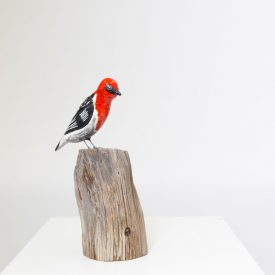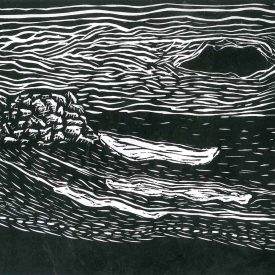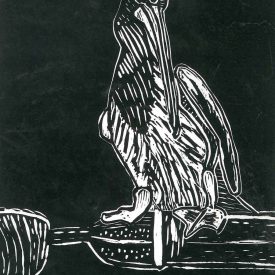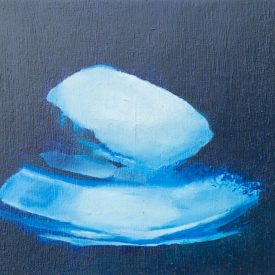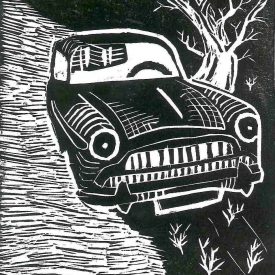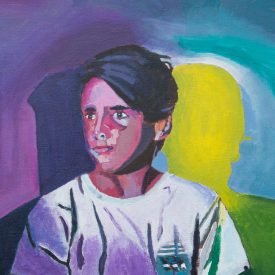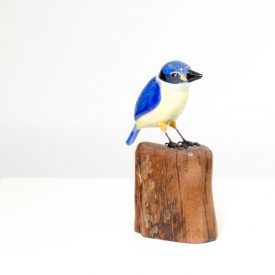No matter how much I tried to find it, there didn’t seem to be an answer this time. If I couldn’t prove what had really happened, then not only would my own reputation diminish, but a woman who wasn’t responsible would pay the price. No matter what, I couldn’t let that happen. I had never lost before. I could never afford to. I would be sent to hell itself before Autumn was convicted. I stared at my hands. My mother had told me that based on my hands I would always be successful. Thinking about my mother always helped. She had been obsessed with the occult, especially palm reading. What was it she had said once? “You will always succeed. Even your own downfall will be brought about by success, and knowledge.” Never had I truly believed her words, but with them at my side, I felt confident. When the signal for the end of the recess finally started, I knew I wouldn’t be going back dejected today.
I walked slowly into the court, my eyes scanning the jury. I could tell that there were many who currently would give a guilty verdict but with experience you could also tell that most of them could be swayed with the right evidence. We were still in luck. With the jury as it was right now, it could work out. I made my way to the stand and studied Autumn. Her verdict had showered suspicion on herself as it had given her ample opportunity to have committed the murder. Even worse was that the bottle could be traced back to a store that she had recently made a purchase from. I had just managed to prove that she had no motive for the murder before the recess. Now I just needed to get evidence as to who did do it, or as to Autumn being completely innocent. The judge took to the stand.
“The Prosecution is ready, your Honor,” stated Sartif.
“The Defense is ready your Honor,” I said.
“Very well, an opening statement Sartif,” he said looking at Sartif.
“Thank you, your Honor. Before the break in proceedings the defendant started pleading guilty after our revelation of the fact that she loved her husband and had no reason to kill him. However, despite this evidence the Defense insists that there is still no concrete evidence against her and believes that she is not the only possible murderer as she met with Miss Rogan as well. To prove this claim false, I would like to call a witness to the stand,” explained Sartif.
My mind sped. He had the demeanor of a man who had already won. If there was a man who could get Autumn pronounced guilty; it was Sartif. I watched the witness walk to the stand. She walked with an air of confidence. It was Miss Rogan. What could she possibly know; did she lie to me back then? Sartif cleared his throat, “This is Miss Rogan and she ate with the deceased on the day of his death. She is also the last person, bar the killer, to see him alive. I will begin my questioning quite simply by asking her to recount the events of that day”. He made a gesture towards Miss Rogan.
“Well it’s quite simple. I was meeting up with Hank to discuss the details of his next show; he had recently been offered an amazing chance. It’s a pity though. We just met at a restaurant and he left after saying he’d think about it. That’s all.”
“Ince, you may begin the cross-examination,” the Judge said.
She hadn’t given much information. I’d need to coax it out of her, but I feel like Sartif wouldn’t let it be that easy.
“Thank you, your Honor. I would like to begin by asking Miss Rogan about the offer he had received. If you could go into more detail please.”
I needed as much information as I could get.
“The offer? Well it was by The Royal Ballet Company. Had he managed to get the job his career would have sky rocketed.”
“So what was his attitude towards the offer whilst you two were eating?”
“Well, it seemed like he was pretty eager to become a part of their company. I can’t imagine anyone who wouldn’t,” she replied.
Why did Sartif use her? She wasn’t helping anyone’s case? My thoughts were interrupted by Miss Rogan.
“Of course, if he were to take the offer then he would have to leave America for the U.K, and he hasn’t exactly got the money to take two along,” she stated calmly.
Dammit all, there was the motive. A seed of doubt entered my mind; could Autumn be guilty? No, thinking like that would get her convicted. The jury was whispering. It seemed like they were thinking the same thing.
It was then the answer hit me. If Autumn was innocent then someone else was guilty. Someone else who had a motive to kill Hank. Who was it?
“Did any others meet Hank that day, or may have come close to meeting him?”
I saw a smirk on Sartif’s face; he thought I was grasping at straws.
“Why, yes, his friend Rebecca lived very near to him, they go, sorry, went, drinking often.”
“Rebecca is also a ballet dancer?” I questioned.
“Yes Becky was the reason that Hank got interested in ballet, why she was probably the happiest out of all of us for Hank’s offer,” she answered.
“That is all the questioning I need. I would like to call the defendant Autumn to the stand.”
She seemed slightly surprised but nevertheless went to the stand.
“I have a few questions Autumn and I want you to answer honestly. Firstly how late was Hank?”
“He was late by ten minutes. He had Becky’s perfume on him.”
As usual she was to the point, and stating that she herself had poisoned him. He had Becky’s perfume on as well. This case just kept getting easier and easier. It made no sense. At this point it seems like all I could do is prolong the trial.
“Can forensics confirm this?”
“Yes, they have already,” replied the associate.
“What was the brand of the perfume?”
“ Oh it was some rare brand, by Jean Pateau I think. It’s pretty hard to come by and has a strange smell. She was probably the only one in the country wearing it,” added the associate.
Jean Pateau. Where had he seen that before? Of course. He had the answer.
“Your Honor, I am almost certain that I have figured out the true culprit behind the crime, but I would need to cross-examine Miss Rogan once more to ask her something.”
“Go ahead, Ince,” replied the judge.
Autumn made her way back to the defendant’s stand whilst Miss Rogan once again took the witness stand. This time she looked a little nervous, her hands caressing her chestnut brown hair. She glanced at me, “What is the question, Ince?”
“Simple. I would like to know why there was a bottle of Rebecca’s perfume in your garbage?”
She froze, shock coming into her eyes.
“Don’t lie I found this smashed bottle in your house. It contains the same type of perfume as Becky is described as wearing. You wore Becky’s scent so that when Autumn is also killed, she will take the blame. Not only did you kill Hank, but you planned to murder Autumn as well. You killed Hank because you were angry that he wouldn’t join The Royal Ballet Company,” I said.
“Objection! What do you mean he didn’t want to join the company? Miss Rogan said he was very enthusiastic!” exclaimed Sartif.
“That’s the problem. If he really wanted to join then that would mean quitting his job and leaving America. However, he didn’t have a passport and from his friends we have gathered that he was very afraid of travelling abroad. We have only Miss Rogan who can tell us what he thought of the trip, but if she were the killer herself then the information loses all credibility. Not only that, but most importantly, is the fact that Miss Rogan possesses ambidexterity, meaning she could just as easily use her left hand as her right. Also it finally makes the missing glove add up. Two weeks ago the ballet group went shopping. All it would’ve taken was for Miss Rogan to ask Autumn to pay for the glove instead.”
I stared at Miss Rogan. She looked pale.
“No, it wasn’t me. It wasn’t me, you have to believe me.”
“For some strange reason I don’t. You had a strong motive. You also had ample opportunity. You see this is becau-”
“Objection. Your Honor, he is badgering the witness,” Sartif claimed; it seemed he was the one who was grasping at straws now.
“Objection overruled, continue Ince.”
“I also have evidence as to it being Miss Rogan. The fact that Becky’s perfume was on his clothes proved that Miss Rogan had much contact. If this meeting had happened like Miss Rogan described, there is no possible way the perfume would’ve got on to the deceased. Also, given that the poison takes effect from contact with the skin, I think it’s almost certain who the real murderer is.”
I looked towards the judge. “Well what a remarkable turn of events. The jury may now make its verdict of Autumn Redford.”
They quickly came up with the innocent verdict. I had done it again. It had seemed impossible, but I had done it. I took a long deep breath. I tried not to, but I couldn’t help a large grin from forming. Autumn walked up to me and looked at my eyes. She grabbed my hands, “Thank you so much. I felt for certain I was gone. As thanks there is something I’d like to tell you. Can I come to your office later?”
“It was nothing, if you really want to come you don’t have to ask me. You’re welcome anytime.”
“Thanks I’ll see you at eight o’clock tonight.”
I sat in my chair slightly nervous. I hadn’t realized until now but Autumn was an attractive woman, who was coming to my office at night. I’ve never been in this kind of situation before and didn’t know what I was supposed to do. A knock at the door increased my nervousness exponentially, but I managed to gather the courage to open the door.
“Hello, it’s nice to see you again,” she said.
“Likewise, you can sit anywhere you’d like.”
She looked around the office before taking a seat in one of the chairs close to the window. “So what is it you wanted to tell me?”
“It’s simple. They aren’t always innocent.”
“What do you mean?”
“It’s simple, Ince. I want to know what is most important to you, justice or getting all of your defendants an innocent verdict?”
I was frozen. The worst part about this is that I myself didn’t know the answer.
“You know, you are a complete fool. Your mother had so much evidence against her, yet you believed her innocent. You became a defense lawyer just to keep others from being convicted, to serve your own form of justice. What do you think if you always get an innocent verdict? You let the criminals free. You needed a lesson and I needed him gone, so I killed two birds with one stone. Just honestly think about it, would your mother really want you to act like this?”
She left through the door with a brisk air. She turned to look at me before exiting. I couldn’t move for so long. I couldn’t think. All I had was shock. I had let the guilty be proclaimed innocent, and that wasn’t the only thing I had done. What would happen to poor Miss Rogan? What had I been thinking earlier? That if I failed a woman who wasn’t responsible who would pay the price? I had succeeded and nothing had changed.

